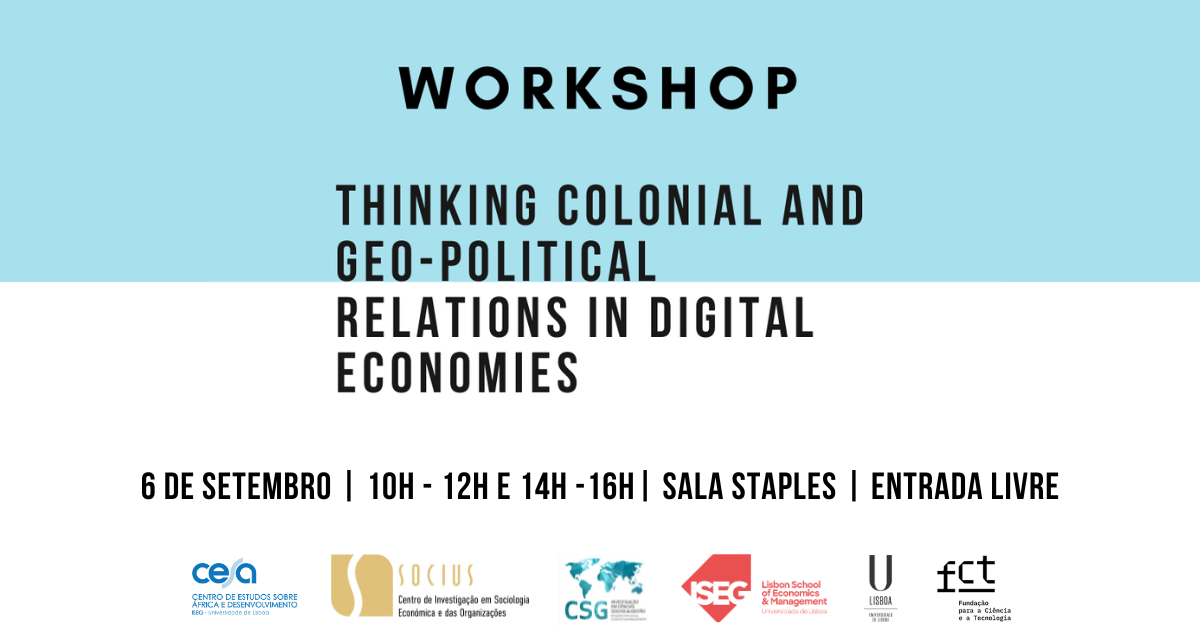CEsA e SOCIUS coorganizam workshop sobre Economias Digitais com entrada livre

📢 ❗ Atenção: Este workshop terá lugar na Sala Staples (Edifício Quelhas, 3.º piso) — e não na Sala Delta como previamente anunciado. ❗📢
O CEsA – Centro de Estudos sobre África e Desenvolvimento e o SOCIUS – Centro de Investigação em Sociologia Económica e das Organizações, ambas unidades de investigação do CSG – Investigação em Ciências Sociais e Gestão (ISEG-ULisboa), convidam para o Workshop Thinking colonial and geo-political relations in digital economies: Mobile financial technology in everyday life, que terá lugar no dia 6 de setembro de 2024, das 10h às 12h e das 14h às 16h, na Sala Staples do ISEG (3º Piso do Quelhas).
As Economias Digitais estão a crescer em todo o mundo e são apresentadas como formas de promover a inclusão financeira através de tecnologias digitais e telemóveis. Em África, por exemplo, as aplicações financeiras digitais, como a microfinança e as criptomoedas, estão a expandir-se, juntamente com o uso empreendedor das redes sociais. Estas tecnologias são promovidas como soluções para problemas financeiros e de subsistência, oferecendo novas formas de gerir a vida diária. Com o tempo, estas ferramentas digitais passam a fazer parte do dia-a-dia das pessoas, influenciando como elas se relacionam, ganham a vida e se integram em sistemas globais. Estes sistemas estão ligados a relações históricas, tecnológicas, políticas, sociais e culturais que atravessam diferentes países e épocas.
O objetivo desta oficina é promover a partilha entre investigadores que estudam as relações de poder, económicas, comerciais, materiais, culturais, ontológicas e sociais que estão a ser forjadas no desenvolvimento dos meios económicos digitais, bem como as formas em que estas são operacionalizadas e utilizadas no quotidiano, visando a reflexão conjunta sobre novos caminhos colaborativos e criativos para a investigação e discussão.
Algumas questões centrais que pretendem ser levadas à discussão:
- O que nos dizem as narrativas atuais sobre a inclusão financeira digital em contextos de baixo rendimento acerca da mudança e reprodução das relações de poder históricas, coloniais e geopolíticas?
- Como é que estas relações se manifestam em aspetos mundanos das vidas das pessoas em diferentes geografias? Como são negociadas?
- Quais são as dimensões simbólicas dos telemóveis, da tecnologia financeira e das aplicações, ao nível local? Como variam estas dimensões geográfica e politicamente?
- Onde está a ser produzido o conhecimento sobre estes temas?
O workshop tem entrada livre, sem necessidade de registo prévio. É coordenado pela investigadora do SOCIUS Inês Faria e enquadra-se no âmbito do projeto de investigação “Digital Microfinance and Financial Ecologies: gender and entrepreneurship in Maputo and Chibuto”.
Participarão com a apresentação de trabalhos: os oradores convidados Euclides Gonçalves (Kaleidoscópio) e Serena Natile (University of Warwick), os investigadores do CEsA Luís Bernardo e Diogo Maia, o investigador do SOCIUS e doutorando em Sociologia Económica e das Organizações Eduardo Ferracioli e os doutorandos em Economia Política Henrique Pinto Coelho, Felipe Rodrigues e Thiago França.
Consulte as comunicações que serão apresentadas pelos investigadores do CEsA
Título: The Impact of FDI on Economic Growth and Inequality in Mozambique: An analysis of the first two decades of the 21st century
 Autor: Diogo Maia
Autor: Diogo Maia
Resumo: This study conducts a comprehensive analysis of the relationship between Foreign Direct Investment (FDI), economic growth, and inequality in Mozambique during the first two decades of the 21st century. The primary objective is to determine whether FDI has contributed to economic growth and to assess whether this growth has led to greater equality or exacerbated inequality. The research methodology involved a data analysis framework, utilizing microdata from Family Budget Surveys in conjunction with macrodata from diverse sources to quantitatively assess the effects of FDI on the Mozambican economy.
The results indicate that while FDI has been a significant driver of economic growth, particularly in the natural resource sectors, this growth has been highly concentrated and insufficiently inclusive, leading to a widening of regional and social inequalities. The influx of FDI has primarily targeted capital-intensive sectors, with the resultant economic benefits disproportionately accruing to a narrow elite, thereby limiting broader economic development and employment generation.
Within the context of Mozambique — a nation characterized by its reliance on extractive industries and susceptibility to external economic shocks — these findings suggest that FDI-driven growth may, paradoxically, contribute to deepening existing inequalities. The study concludes that for FDI to promote more equitable and sustainable growth, strategic policies must be implemented to diversify the economy and ensure a more equitable distribution of the gains from foreign investment.
Título: Geoeconomics and Digital Competition: The Global Gateway, infrastructural power and governed interpendence beyond nation-States
 Autor: Luís Bernardo
Autor: Luís Bernardo
Resumo: This paper examines the digital component of the Global Gateway strategy. I mobilize the concepts of governed interdependence and infrastructural power to understand how the EU – and its current developmental avatar, Team Europe – is shifting its repertoire to suit a more competitive, if not exactly confrontational world order. Since 2021, the European Union has promoted the Global Gateway as the €300bn European move in the “global battle of offers” in infrastructure investment. This strategy aims to build “smart, clean and secure links” across systems worldwide. It is the European counterpart to the Chinese Belt and Road Initiative (BRI) and the US Build Back Better World (B3W). Importantly, the von der Leyen Commission has mobilized development cooperation resources in order to kickstart the Global Gateway: indeed, NDICI – Global Europe is the 2021-2027 EU financial envelope for development cooperation and, as it stands, it remains the world’s largest. The Global Gateway comprises five sectoral priorities: climate and energy, the digital sector, education and research, health and transport. Though there is significant overlap among each sectoral priority, the digital component is striking as it illustrates how the hybrid character of EU power, namely its material capacity to implement projects and its regulatory capacity to define how projects ought to be implemented.
In this paper, I underline the importance of business actors – mainly but not exclusively private – in the enactment and projection of geoeconomic power through the digital component of Global Gateway: if digital connectivity requires data, it also requires infrastructure, regulatory standards and governance capacity, none of which the EU as a whole or member-States and their development agencies are able to deploy independently from European business. In this sense, governed interdependence, understood as the set of strategies employed by States in their interaction with actors under their jurisdiction in order to shape relations with global markets, is potentially useful to understand where the Global Gateway is going and where it is leading the EU. Finally, this paper also discusses infrastructural power as a competitive edge in the “global battle of offers”: if the Brussels Effect applies to the Global Gateway, it would be a clear instance of infrastructural power beyond the scope of EU territorial sovereignty and thus part of the global movement towards a “new economic statecraft”. This paper discusses these issues as they relate to the digital component of the Global Gateway.
Imagens: CEsA/Reprodução





